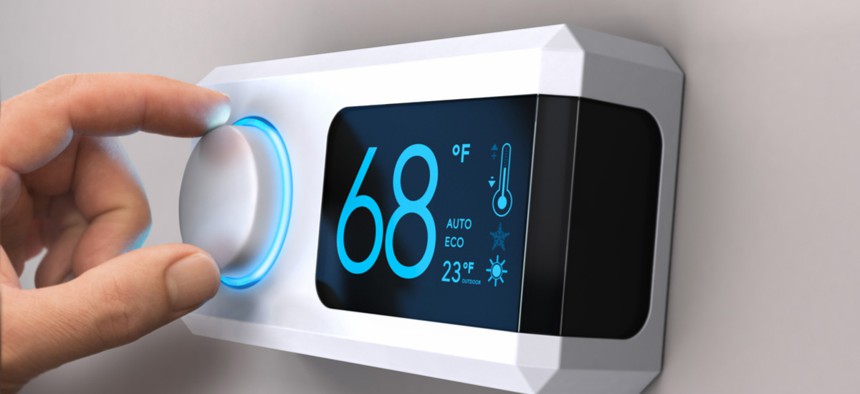Yes, Your Coworkers Are Secretly Changing the Office Temperature

Olivier Le Moal/Shutterstock.com
Temperature dissatisfaction can reportedly affect productivity.
Few office debates are more fraught than the thermostat. While some of us envelop our goosebumps in desk blankets, others bask in glacial air-conditioning, unfettered by the dissonance between summer heat and open-layout freezers.
Then of course there’s Jim, who always seems comfortable. No one likes Jim.
As summer approaches, these temperature debates will only intensify—sometimes escalating into full-blown arguments. According to a new, nationally representative CareerBuilder survey of over 1,000 full-time, private sector American workers, nearly half say their office is either too hot or too cold.
This temperature dissatisfaction has bottom-line influence, as 51% of respondents say that working in an office that’s too cold hurts their productivity, while 67% say that working in an office that’s too warm does the same.
What’s worse, according to this survey, 15% of workers say they’ve argued with coworkers about the office temperature, either in person or via messaging platforms. And to confirm your deep-seated suspicions, a striking one in five of us has secretly adjusted the office thermostat during the summer (13% of survey respondents said they made it cooler, while 6% made it warmer).
Spend one summer in an office, and you’ll realize the primary factor influencing office temperature battles is gender. With good reason—men are literally freezing women out of the workplace. As Quartz’s Gwynn Guilford explains, “female office workers around the world brace for hot weather by bundling up—even as their male colleagues type away in shirtsleeves. There’s a simple reason: Office temperatures are designed for men.”
This reality was confirmed by a 2015 study published online in Nature Climate Change, Guilford noted. It found that women’s body temperatures are lower than the standard used to set air-conditioning levels, making women much more prone to feeling uncomfortably cold.
The CareerBuilder survey identified similar trends. While nearly 40% of women say they’re too cold, only 18% of men agreed. Men and women agree more on heat, as 17% of men and 19% of women say their offices are too warm. As for who’s arguing, over three times as many women (22% compared to 7% of men) say they’ve confronted a coworker about uncomfortable office temperatures. This divide only amplifies the sexist nature of thermostat settings.
“The discrepancy dates back to the 1960s and ’70s, when scientists and regulators set workplace indoor climate standards based on the metabolic rate of a 40-year-old man weighing 70 kilograms (154 pounds),” Guilford wrote. “Women, however, tend to have lower metabolic rates. That means the steady blast of Arctic air conditioning that keeps the average guy comfortable is likely to send women swaddling themselves in cardigans and thermal socks.”
While nearly half of CareerBuilder’s survey respondents say they deal with office temperatures by drinking cool beverages, or dressing in layers, it’s worth considering that turning down the AC could drastically reduce energy consumption and electricity bills, while contributing to a more productive, gender-equitable culture. Plus, think of the time you’ll save not packing five layers in mid-August.





